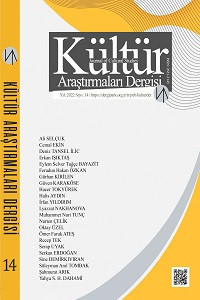Thanatopolitika ve Danse Macabre: Andrey Platonov’un Can Adlı Eserinde Ölümün Siyasallaşması
Thanatopolitika, Biyopolitika, Andrey Platonov, Stalinizm, Danse Macabre
Thanatopolitics and Danse Macabre: Politicization of Death in Andrey Platonov’s Dzhan
Thanatopolitics, Biopolitics, Andrey Platonov, Stalinism, Danse Macabre,
___
- Aleynikov, Oleg Yur'yeviç (2015). “Semantika imyon personajey v povesti A. Platonova «Djan»”. Vestnik Voronejskogo gosudarstvennogo uni-versiteta, 2: 5-8.
- Aydın, Abdurrahman (2016). “Giorgio Agamben: Etten İbaret İnsan ve Biyopolitika Makinesi”. Biyopolitika Cilt 2- Foucault’dan Günümüze Biyopolitikanın İzdüşümleri. (Ed. Onur Kartal). Ankara: NotaBene, 109-134.
- Bodin, Per‐Arne (1991). “The Promised Land -Desired and Lost. An Analysis of Andrej Platonov's Short Story “Džan”. Scando-Slavica, 37.1: 5-25.
- Bragina, Natal'ya Nikolayevna (2008). "«Vostoçnıye» povesti A. Platonova kak popıtka dialoga dvuh kul'tur". Vestnik Nijegorodskogo universiteta im. N.I. Lobaçevskogo, 6: 297-302.
- Bullock, Philip Ross (2012). “Platonov and the Open Text”. Ulbandus Re-view (Andrei Platonov: Style, Context, Meaning), 14: 302-317.
- Eco, Umberto (1992). Açık Yapıt. (Çev. Yakup Şahan). İstanbul: Kabalcı.
- Esgün, Toros Güneş (2016). “Thomas Hobbes ve Modern Devletin Biyopo-litik Kuruluşu”. Biyopolitika Cilt 1- Platon’dan Arendt’e Biyopolitikanın Felsefi Kökenleri. (Ed. Onur Kartal). Ankara: NotaBene, 105-127.
- Foucault, Michel (2000). “The Political Technology of Individuals”. Power. The Essential Works of Foucault. 1954-1984. Vol. 3. (Ed. James D. Faubion). (Trans. Robert Hurley and others). New York: The New Press, 403-417.
- Ghanim, Honaida (2008). “Thanatopolitics: The Case of the Colonial Occupation in Palestine”. Thinking Palestine. (Ed. Ronit Lentin). Lon-don & New York: Zed Books, 65-81.
- Gryaznova, Anna Yur'yevna (2011). "Obraz ottsa v povesti A. Platonova «Djan»". Vestnik Kostromskogo gosudarstvennogo universiteta, 17. 5-6: 145-148.
- Hacızade, Leyla (2006). A.P. Platonov’un Eserlerinde İnsan. Yüksek lisans Tezi. Konya: Selçuk Üniversitesi Sosyal Bilimler Enstitüsü.
- Hiltay, Lal (2016). “Kutsal İnsan, Andrey Platonov ve Can”. Çevrimdışı İstanbul, 4: 80-86.
- İvanenko, Yelena Anatol'yevna (2019). "Harakteristiki «jertvennogo tela» v gorizonte biopolitiki i informatsionnıh tehnologiy (na materiale sovremennıh fantastiçeskih blokbasterov)". Vestnik Samarskoy gumanitarnoy akademii, 1.25: 31-54.
- Joronen, Mikko (2016). “‘Death Comes Knocking on the Roof’: Thanatopolitics of Ethical Killing During Operation Protective Edge in Gaza”. Antipode 48: 336–354.
- Kaminskij, Konstantin (2013). “Naked Soul on Naked Soil: Economics and Ethnogenesis of «Džan»”. Die Welt der Slaven, 58. 2: 261-275.
- Kartal, Onur (2019). Yaşayan Ölüler. Sinema, Biyopolitika ve Felsefe. İstanbul: İthaki.
- Kaşoğlu, Ayla (2012). “A. Platonov’un ‘Can’ Adlı Eserinde Yeni Düzenin İnsan ve Toplum Üzerindeki Etkisi”. Avrasya Uluslararası Araştırmalar Dergisi, 1.1: 8-1.
- Khazanov, Pavel (2018). “Honest Jacobins: High Stalinism and the Socialist Subjectivity of Mikhail Lifshitz and Andrei Platonov”. The Russian Review, 77: 576–601.
- Klyanina, Yelizaveta Romanovna (2014). "Simvolı i obrazı smerti v yevro-peyskom iskusstve". Gumanitarnıye vedomosti TGPU im. L.N. Tolsto-go, 3. 11: 140-145.
- Malıgina, Nina Mihaylovna (1995). Hudojestvennıy mir Andreya Platonova. Moskva: MPU.
- Murray, Stuart J. (2006). “Thanatopolitics: On the Use of Death for Mobilizing Political Life”. Polygraph, 18: 191–215.
- Murray, Stuart J. (2008). “Thanatopolitics: Reading in Agamben a Rejoinder to Biopolitical Life”. Communication and Critical/Cultural Studies 5. 2: 203-207.
- Nasir, Muhammed Ali (2017). Biopolitics, Thanatopolitics and Right to Life”. Theory, Culture and Society 34.1: 75-95.
- Özmakas, Utku (2018). Biyopolitika: İktidar ve Direniş. Foucault, Agamben, Hardt-Negri. İstanbul: İletişim.
- Platonov, Andrey (2018). Birbirimiz İçin Yaşayacağız (Mektuplar). (Çev. Erdem Erinç). İstanbul: Metis.
- Platonov, Andrey (2013). Can. (Çev. Günay Çetao Kızılırmak). İstanbul: Metis.
- Romanovskaya, Irina Valer'yevna (2014). "Kontsept «Duşa» v povesti A. Platonova «Djan»". Problemı istoriçeskoy poetiki, 12: 499-512.
- Sivkov, Denis Yur'yeviç (2014). "Paradoksı autoimmuniteta. Predisloviye k perevodu Eda Koena", Sotsiologiya vlasti, 4: 174-181.
- Skakov, Nariman (2011). “Prostranstva «Djana» Andreya Platonova”. Jurnal NLO, 1: 1-20.
- Yetkin, Gülhanım Bihter (2015). A.P. Platonov’un Eserlerindeki Ütopya Anlayışına Başlıca Örnekler. Yüksek Lisans Tezi. Ankara: Gazi Üniversitesi Sosyal Bilimler Enstitüsü.
- Yıldırım, Adem (2016). “Hannah Arendt’te Biyopolitika Düşüncesi”. Biyo-politika Cilt 1- Platon’dan Arendt’e Biyopolitikanın Felsefi Kökenleri. (Ed. Onur Kartal). Ankara: NotaBene, 249-279.
- Zavarkina, Marina Vladimirovna (2013). “«Kanoniçeskiye» janrı sovetskoy literaturı 1930-h gg. i povesti A. Platonova”. Vestnik Çerepovetskogo gosudarstvennogo universiteta, 2. 48: 61-65.
- Zavarkina, Marina Vladimirovna (2016). “Utopiya i mif v povesti A. Plato-nova «Djan»”. Uçyonıye zapiski Petrozavodskogo gosudarstvennogo universiteta, 5. 158: 105-109.
- ISSN: 2651-3145
- Yayın Aralığı: Yılda 4 Sayı
- Başlangıç: 2018
- Yayıncı: Mehmet Ali YOLCU
Thanatopolitika ve Danse Macabre: Andrey Platonov’un Can Adlı Eserinde Ölümün Siyasallaşması
Arkaik Yolculuğun Yeniden Üretilmesi Bağlamında “İyi Biri” Filmi
Cansu İRMAK, Ayşe SEZER, Berkant ÖRKÜN
Selim İleri’nin “Elimde Viyoletler/Beklenen Sevgili” Adlı Romanı Üzerine Bir İnceleme
Roman Dilini Sinemaya Yaklaştıran Gizli Aktör: Edimsözler
XIX. Asırda Yeni Dil ve Çok Anlamlılık
Burhâneddîn-i Belhî’nin Mesnevi ve Kasidelerinde Zaman ve Mekân
Dede Korkut Kitabı’nda İktidar ve Toplumsal Cinsiyet İlişkisi Bağlamında Bayındır Han
